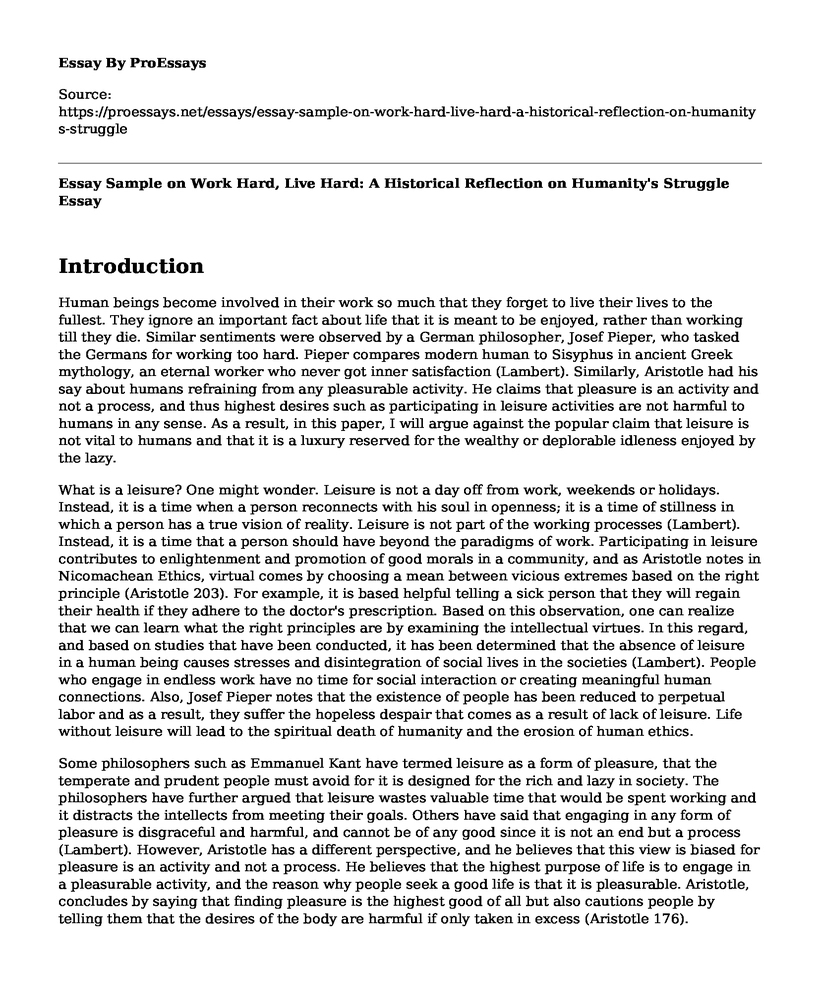Introduction
Human beings become involved in their work so much that they forget to live their lives to the fullest. They ignore an important fact about life that it is meant to be enjoyed, rather than working till they die. Similar sentiments were observed by a German philosopher, Josef Pieper, who tasked the Germans for working too hard. Pieper compares modern human to Sisyphus in ancient Greek mythology, an eternal worker who never got inner satisfaction (Lambert). Similarly, Aristotle had his say about humans refraining from any pleasurable activity. He claims that pleasure is an activity and not a process, and thus highest desires such as participating in leisure activities are not harmful to humans in any sense. As a result, in this paper, I will argue against the popular claim that leisure is not vital to humans and that it is a luxury reserved for the wealthy or deplorable idleness enjoyed by the lazy.
What is a leisure? One might wonder. Leisure is not a day off from work, weekends or holidays. Instead, it is a time when a person reconnects with his soul in openness; it is a time of stillness in which a person has a true vision of reality. Leisure is not part of the working processes (Lambert). Instead, it is a time that a person should have beyond the paradigms of work. Participating in leisure contributes to enlightenment and promotion of good morals in a community, and as Aristotle notes in Nicomachean Ethics, virtual comes by choosing a mean between vicious extremes based on the right principle (Aristotle 203). For example, it is based helpful telling a sick person that they will regain their health if they adhere to the doctor's prescription. Based on this observation, one can realize that we can learn what the right principles are by examining the intellectual virtues. In this regard, and based on studies that have been conducted, it has been determined that the absence of leisure in a human being causes stresses and disintegration of social lives in the societies (Lambert). People who engage in endless work have no time for social interaction or creating meaningful human connections. Also, Josef Pieper notes that the existence of people has been reduced to perpetual labor and as a result, they suffer the hopeless despair that comes as a result of lack of leisure. Life without leisure will lead to the spiritual death of humanity and the erosion of human ethics.
Some philosophers such as Emmanuel Kant have termed leisure as a form of pleasure, that the temperate and prudent people must avoid for it is designed for the rich and lazy in society. The philosophers have further argued that leisure wastes valuable time that would be spent working and it distracts the intellects from meeting their goals. Others have said that engaging in any form of pleasure is disgraceful and harmful, and cannot be of any good since it is not an end but a process (Lambert). However, Aristotle has a different perspective, and he believes that this view is biased for pleasure is an activity and not a process. He believes that the highest purpose of life is to engage in a pleasurable activity, and the reason why people seek a good life is that it is pleasurable. Aristotle, concludes by saying that finding pleasure is the highest good of all but also cautions people by telling them that the desires of the body are harmful if only taken in excess (Aristotle 176). Nevertheless, none is supreme and preferable than the pleasures of the mind. Based on this view, leisure is critical as it an attitude of the person who opens his soul to the outside world, and let's go of his frustrations and burdens. It is a celebratory gaze of the inner eye upon which the miracle and the amusement of creation are seen.
Conclusion
In conclusion, leisure is not wastage of time nor is it designed for the lazy or rich in society. Instead of creating a work centered culture, people should strive to obtain actual knowledge of what surrounds them and have a sense of wonder. Leisure is an activity that will strike a sociological balance that man badly needs, and he must regain it to ensure a healthy community. Through the stoners of leisure and the guide of wonder, humans are led to real philosophizing that entails beatific vision, and a taste of success that people get when they attain their ultimate purpose.
Works Cited
Aristotle. The Nicomachean Ethics of Aristotle: Tr. with Notes, Original & Selected; an Analytical Introduction; and Questions for the Use of Students. 1850.
Lambert, C. "Josef Pieper: Sisyphus and the Defense of Leisure." vimeo.com/16982563.
Cite this page
Essay Sample on Work Hard, Live Hard: A Historical Reflection on Humanity's Struggle. (2023, Jan 09). Retrieved from https://proessays.net/essays/essay-sample-on-work-hard-live-hard-a-historical-reflection-on-humanitys-struggle
If you are the original author of this essay and no longer wish to have it published on the ProEssays website, please click below to request its removal:
- Why Kant's Theory was Revolutionary? - Essay Sample
- Compare and Contrast Essay on Free Will vs. Determinism
- Self-Assessment Paper Example
- Corporates Misdeeds: The Biggest Business Scandals of 2017 Essay
- The Validity of Interviews - Paper Example
- Race & Identity: How Morality Influences Our Decisions - Essay Example
- Decision-Making Process for Recruiting Staff - Report Example







